

*Online Searching: 6 Controlled Vocabulary. Change the Subject - Change the subject / a film by Sawyer Broadley, Jill Baron, Óscar Rubén Cornejo Cásares, Melissa Padilla. Project Information Literacy: The Algo (algorithm) Study. Big Tech’s Pandemic Power Grab - The Atlantic In the years before the virus, critics began to prophesy that a handful of tech companies would soon grow more powerful than the government.
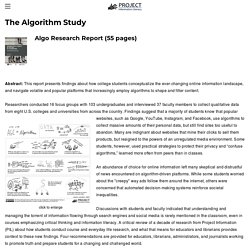
Their scale and influence, and their ability to manipulate public opinion and shape markets, would permit them to reign unimpeded. That warning, however dark, didn’t quite capture the emerging strategy of these firms—a strategy that was in fact taking shape before the pandemic began—or the graver threat they pose. Rather than supplanting government, they have, in essence, sought to merge with it. *Selected Controlled Vocabularies and Classification Systems Available Online. Controlled Vocabulary (ALA) 1.
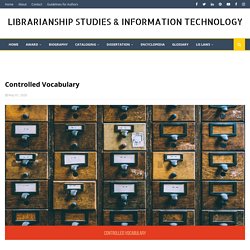
Simple Term Lists (Pick Lists) 2. Thesauri 3. Subject Heading Lists (e.g. LCSH, SLSH) 4. 5. 6. 7. 8. Controlled vocabularies appear in a variety of forms. These lists are not concerned with semantic relationships. Examples might be geographic areas (maybe a list of countries or states or cities); maybe a list of languages; or perhaps a list of formats (which might include terms such as text or sound or image). Two examples of simple term lists are (a) An alphabetical list of states, e.g., Alabama, Alaska, Arizona, California, Delaware... Simple term lists need not be hierarchical, if the list is short and there is some intuitive way of navigating the list, it can be useful without further structure. Subject Heading Lists A classic and widely used form of Controlled Vocabulary is the Subject Heading List.
Subject Heading List is the printed or published list of subject headings which may be produced from the subject authority file maintained by an organization or individual. Janis L. ProQuest Dialog: Use the Thesaurus. How (and Why) to Use the APA Thesaurus When Searching PsycINFO via OvidSP. ERIC Thesaurus and Identifier Update. Part 1 – Thesaurus Overview and Background.
ERIC - Education Resources Information Center. Purpose and Scope The ERIC Thesaurus is a list of terms representing research topics in the field of education. Branching Out: The MeSH Vocabulary. Skip Navigation Bar U.S.
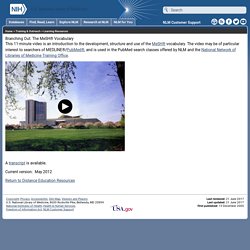
National Library of Medicine NLM Customer Support Home > Training & Outreach > Learning Resources. MeSH Browser. ProQuest Thesaurus. ERIC: Finding the Right Descriptors for Your Search. *The bias hiding in your library. *The bigot in the machine (Barbara Fister) The New York Technical Services Librarians, an organization that has been active since 1923 – imagine all that has happened in tech services since 1923!

– invited me to give a talk about bias in algorithms. Controversies in the Library of Congress Subject Headings (LCSH): the Case of Illegal Aliens. Crystal Vaughan in her article The Language of Cataloguing: Deconstructing and Decolonizing Systems of Organization in Libraries⁶ writes: "As society, politics, and economies change, so too does the language of representation.
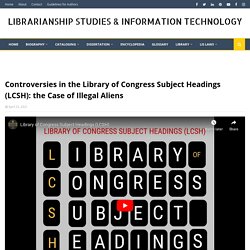
Therefore, the Library of Congress subject headings (LCSH) as a system of categorization is only as effective as the language that is used to define what is and what is not. Moreover, those who control the language of categorization control access to the information categorized within that system. Consequently, librarians must always be critical of the language they are using in their information organization systems. Language is continuously evolving according to societal discourse and politics; therefore, if libraries are to maintain their social responsibility to provide information to all, including socially disadvantaged and marginalized peoples, then librarians must continuously advocate for changes to subject headings. Strategies for alternate subject headings and maintaining subject headings - Hanging Together. That was the topic discussed recently by OCLC Research Library Partners metadata managers, initiated by Stephen Hearn of the University of Minnesota, Sharon Farnel of the University of Alberta, and Erin Grant of the University of Washington.
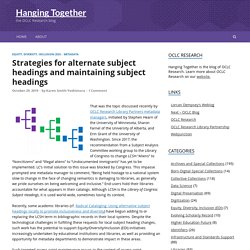
Since 2017, the recommendation from a Subject Analysis Committee working group to the Library of Congress to change LCSH “Aliens” to “Noncitizens” and “Illegal aliens” to “Undocumented immigrants” has yet to be implemented. LC’s initial solution to this issue was blocked by Congress. This impasse prompted one metadata manager to comment, “Being held hostage to a national system slow to change in the face of changing semantics is damaging to libraries, as generally we pride ourselves on being welcoming and inclusive.” End-users hold their libraries accountable for what appears in their catalogs.
Although LCSH is the Library of Congress Subject Headings, it is used world-wide, sometimes losing its context. Browsing through Bias: The Library of Congress Classification and Subject Headings for African American Studies and LGBTQIA Studiesproject muse 706989. 'Words Matter': Why The UC Berkeley Library Is Embracing Another Term For 'Illegal Aliens' Editor’s note: This article contains terms that, while offensive, are included to provide historical context.
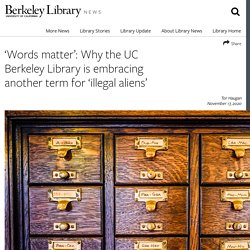
Gisèle Tanasse’s class visits come with an apology. When she’s introducing students to the UC Berkeley Library, and helping them sift through its collections using the online catalog, she warns them about what they might find. “You’re going to see some things that are really othering and problematic,” says Tanasse, Berkeley’s film and media services librarian, recalling her message to students during a pre-pandemic interview at Moffitt Library’s Media Resources Center.